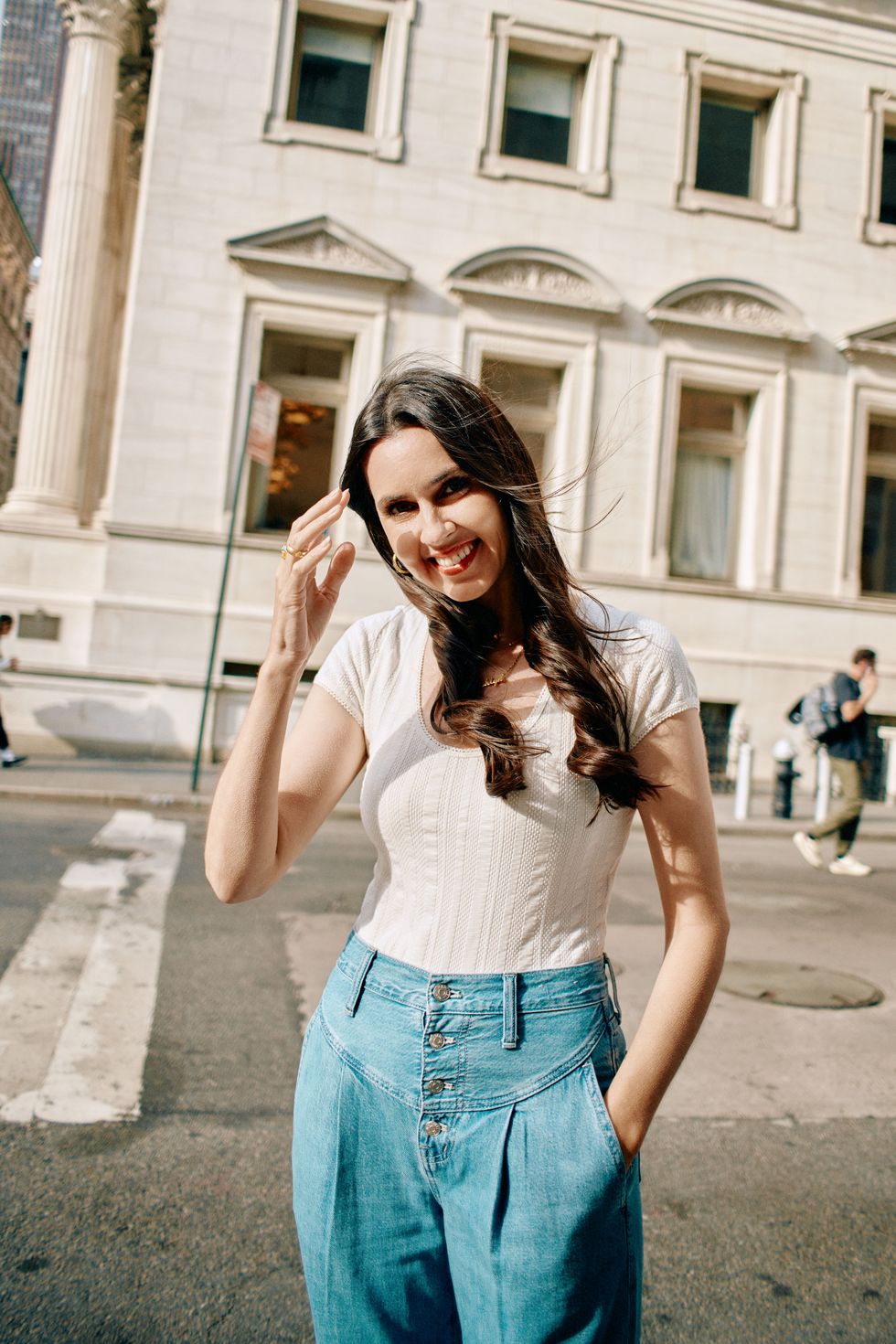Can Taylor Lorenz Fix the Internet?
One million years ago, in 2009, the first image had yet to be posted on Instagram, “friend” was just starting its transformation into a verb, and the internet was still, by and large, considered a realm you could enter and leave at will. It was also the Great Recession, and jobs were scarce. Which is how Taylor Lorenz, then in her twenties, signed up with a temporary work agency and found gigs doing the types of administrative tasks that stretch time out like taffy. Until one day when her cubicle mate showed her a portal. “Oh, I just go on Tumblr all day,” the woman said.
Lorenz spent the rest of the afternoon scrolling and exploring the blogging platform, which teemed with the open, hopeful energy of a new world. Then she went home, logged back in, and kept going. After years of never finding where she fit in, Tumblr introduced her to a space where she felt, finally, at home: the internet.
Now, the Washington Post reporter, whose first book, Extremely Online: The Untold Story of Fame, Influence, and Power on the Internet, is out today, is one of the most extremely online (per her title) reporters in the country, and one of the most discussed.
At The Daily Beast, The Atlantic, the New York Times, and now the Post, she has pioneered, legitimized, and dominated a beat sometimes described as “internet culture.” Thanks to her, people who get their news from newspapers understand “ok boomer” is an insult and are familiar with the adjective cheugy. The same goes for the conspiracy parody group Birds Aren’t Real, the 14-year-old creator who originated the TikTok dance known as the Renegade, and the formerly anonymous right-wing influencer account Libs of TikTok.
Lorenz remains immersed in the world she covers: She has over half a million followers on TikTok and over 346,000 on Twitter, recently rebranded as X. (We’ve continued to refer to it as Twitter here for clarity.) And while Lorenz doesn’t monetize her content, she navigates social media like a lot of people who do, in that she’s attuned to engagement, undeterred by conflict, and plainly interested in brand-building. On TikTok, she offers tips for early-career journalists and slaps back at nasty comments. On Twitter, she posts, reposts, argues, replies, opines, signal boosts, subtweets, and sometimes even apologizes at a steady clip.
Somewhere along the way, though, Lorenz has become not just a journalist, but a phenomenon. Tucker Carlson, in one of his numerous Lorenz-focused segments, described her as being “at the very top of journalism’s repulsive little food chain.” She is the terrain upon which people fight battles about the perils of social media and journalism, about misogyny and trolls, as well as someone who has been ingested by the attention economy and refracted back as a million pieces that float around the internet, alternately true and totally twisted. She is 24, she’s 50, she has a trust fund, she is a talented reporter, she has ties to the Clintons, she is a lizard (yes, a lizard). She is, in other words, not just synonymous with her beat but representative of it. As she has put it, she has lost the narrative of her own life.
The toxicity of online spaces, though, has not led Lorenz to disengage (she did take a five-month break from Twitter while working on her book but said it led her reporting to suffer). Last May, as a new set of claims led her to go viral on Twitter for the umpteenth time, she could be found riding the wave. “Go ahead and drop all the conspiracies about me you want, it only adds to my lore,” she tweeted.
When I meet Lorenz in person, I learn not all the lore is false. She is vegan and often keeps the thermostat in her home at 87 degrees: “My body temperature’s very low,” she says on a recent morning in Washington Square Park in New York, where she’s visiting for work. “I always joke that I am part lizard, so the lizard conspiracy is very apt.” She moved from her 400-square-foot Brooklyn apartment to East Los Angeles during the summer of 2020, looking for more space in which to quarantine. Most mornings, she makes fresh nectar for her hummingbird feeders and watches the birds. Most nights, she watches a horror movie—she once read they can help people externalize anxiety and thought that made sense.
But despite Lorenz’s frequently stated belief that there is no distinction between being online and offline—“the internet is the world,” she tells me—the person I anticipated from her social media is different from the one I meet. Online, it’s not uncommon to find Lorenz, who’s immunocompromised, writing posts like this: “It’s wild how quickly a certain brand of leftist went from ‘healthcare is a human right!!!’ to ‘disabled people should shut up and die already and stop asking for basic COVID protections bc I am fine with normalizing mass death/disability as long as it doesn’t disrupt my brunch.’ ” In person, though, she is apologetic even asking if we can move when someone nearby begins coughing. (Navigating COVID as a high-risk person, she says, sometimes leaves her feeling like she’s in a zombie movie.) “I don’t think I’m the type of person who’s militant about anything,” she says, adding that the night before, she hung out with an old friend who loves Carlson so much she calls him her boyfriend.
Lorenz is also “very open to many points of view,” impulsive (“which is not a good quality,” she says), and by turns kind and combative, confident and self-effacing. “It’s funny when people paint her as controversial,” says her friend Kat Tenbarge, a tech and culture reporter at NBC News. “I’m like, ‘Not in real life.’ ” Lindsey Underwood, an editor at the Washington Post, describes her as “a regular-ass girl” who is notably generous—when Underwood was moving to L.A., Lorenz checked out a prospective home for her. “How she’s seen online is perplexing,” says Cooper Fleishman, who edited some early pieces of Lorenz’s at the online news site Mic. “She welcomes [disagreement] and throws herself in there. But the backlash is so far out of proportion to what she’s actually saying that it feels like, Is this a thing? Or is the right turning her into a caricature? And are we playing into that?”
Part of what inflames matters is that Lorenz sometimes, for example, calls out public figures for problematic tweets they made as teenagers, while auto-deleting her own tweets, putting her in the middle of hot-button debates around cancel culture, hypocrisy, and language. (“I think having a long history of everything you’ve ever said on the internet is insane, actually,” she says.) Some who have interacted with Lorenz on Twitter question if she engages with others in ways that increase the platform’s toxicity. One person who worked on a piece about long COVID that Lorenz harshly criticized says, “It comes back to a super interesting thing: Her career is about how the internet breaks people’s brains, and her beat involves understanding why a certain kind of discourse is problematic. Yet she sometimes acts in ways that are very antagonistic and not productive.”
It’s hardly unusual to find acrimonious debates online. What remains surprising is that Lorenz, whom her former boss Neetzan Zimmerman (who has himself been called a viral news genius) describes as smarter about the internet than anyone he’s ever met, can seem so taken aback by how she’s perceived. “What have I ever done that’s controversial?” she says to me at one point. I suggest her COVID views might be seen that way. “I don’t know,” she says, then proceeds to list views that are indeed not that controversial, but also not what I, at least, expected from her posts. “I think the majority of people would want investments in vaccines,” she says. “We desperately need clean air standards for buildings. Paid sick leave. By the way, people should have accessible health care. I guess that’s controversial, but truly, are you kidding me?”
How much should a journalist be judged by what they do on social media anyway? Lorenz has often been at the center of this debate both because her Twitter presence sometimes overshadows her journalism and because her critics use any missteps she makes there to undermine her legitimacy. Which Lorenz finds absurd. “It’s like I’m living in a crazy land,” Lorenz says. “The internet is the world. What if you’re at a dinner party and somebody says, ‘Oh, x y z,’ and somebody else says ‘That’s not right,’ and you say ‘Oh, my bad.’ So you should never be a journalist again?”
Even a few years ago, Lorenz was able to move easily through the internet. She sold furniture on Instagram Stories and used Twitter to recommend her newly available apartment to potential renters. In recent years, though, beneath just about every YouTube video featuring her there are dozens, if not hundreds, of comments criticizing her, often in very personal terms. Lorenz has also described being barraged with hateful messages, including rape and death threats, via every channel through which she can be reached—her cell phone, Facebook, Instagram, Twitter DM. She says she has been doxxed and experienced a swatting attempt, has had law enforcement sent to the homes of family members, and has been a target of stalking.
In 2022, Lorenz spoke to MSNBC for a segment about online harassment in which she talked about having PTSD. Screenshots from a moment when Lorenz briefly broke down in tears were later used to mock and shame her. Lorenz remains very critical of the segment. “If you have [an under-three-minute] segment, there’s no way you can provide the proper context so that image won’t immediately be screenshot and used for harassment,” she says in our interview. “I cannot wait for cable news to rot in hell.” She has said in the past that certain types of media coverage have caused more harm to her than anything else.
Just two weeks after the MSNBC story ran, Lorenz published a piece revealing the name of the person behind Libs of TikTok. The backlash was enormous. (The right-wing site The Daily Wire put up a massive billboard in Times Square that read, “Taylor Lorenz Doxxed @LibsofTikTok.”) “I’ve dealt with reporters who have been in war zones and have also taken online harassment, and to be perfectly honest, when they’re in distress and talking to me, I hear the same tone in their voice,” says Mark Seibel, Lorenz’s editor at the Post.
As a result, she no longer shares certain details of her life, because they make her easier to find—her age, for example. (Plus, “it’s irrelevant,” she says.) She doesn’t share her dating status. In terms of her family, all she’ll say is that she grew up in Old Greenwich, Connecticut. “Every little piece of information you give, it’s going to sprout five more pieces of misinformation,” she says. “You want to be like, ‘You’re wrong.’ But it’s fruitless. The truth doesn’t matter.” She doesn’t believe all criticism of her is unfair—“I’ve made so many mistakes on the internet over the years,” she says. What she takes issue with are discussions of her personal life unrelated to her work.
She will speak about aspects of her background that haven’t become conspiracy fodder. As a young person, Lorenz felt alienated; as soon as she was old enough, she began escaping to the city. “I’m very dyslexic, and school was always a really hard time,” she says. She didn’t seek community online, though. Instead, she worked.
By age 14, she had already been employed as a mother’s helper and a gift wrapper, and had volunteered as a candy striper at Greenwich Hospital, delivering mail and busing dishes in the cafe. During college, she sold replacement windows door-to-door; after graduation, she worked as an administrative assistant and, at one point, at a call center for Vineyard Vines. Then she started temping and found Tumblr. Soon she’d started dozens of blogs on the platform. One of the more popular focused on sprinkles; another was about bagels. The thrill was seeing how big she could get them to be, and soon some had thousands of followers, giving her an early taste of virality. While it wasn’t clear yet how she’d make this her life, she knew she wanted to.
In 2012, she was hired by an ad agency to handle social media for brands; she ran Verizon’s Facebook page and helped with Bud Light’s. A year later, she noticed the Daily Mail—“literally my favorite website”—didn’t have a Facebook page. She was soon handling their social media globally. Around then, she started freelance writing stories about the newly emerging world of online virality and fame. “She began to realize it wasn’t just language shifting and culture shifting, it was power,” Fleishman says. “That’s what Taylor spearheaded in journalism—looking at internet culture as a nexus of power.”
Even before she was well known as a reporter, Lorenz showed up in the news. While living in Baltimore in 2015, she witnessed a fatal stabbing: “Blood just started erupting out of his chest,” Lorenz told the Baltimore Sun. In early 2016, she was riding an Amtrak train hit by an unknown object. “There was this great boom,” she told CBS afterward.
“My mom says I’m like Forrest Gump,” she says now. “If there’s something going on, I’m running toward it.” As the then director for emerging platforms for the political website The Hill, Lorenz was live streaming the 2017 Unite the Right rally in Charlottesville when James Alex Fields Jr. drove his Dodge Challenger into the crowd, killing Heather Heyer. (Her footage ended up in Spike Lee’s film BlacKkKlansman.) Not long after, she decided to try to be a full-time reporter—her beat and the country’s narrative seemed to be folding in on each other. “The far right has always embraced this media ecosystem, so when Trump was elected, all these YouTubers and people that I knew from the influencer world were suddenly relevant,” she says.
Lorenz took a huge pay cut to take a job at The Daily Beast as a tech and culture reporter. She was there for only seven months before moving to The Atlantic, then was poached by the Times a year and a half later. By the time she moved to the Washington Post in 2022, she was such a big name that her job change was the subject of extensive media speculation, especially because it had previously been reported that Times editors had discussed how to deal with the turmoil created by her social media presence (she also occasionally sparred with colleagues on Twitter, including on her way out the door).
Leaving for the Post had nothing to do with internal issues, Lorenz maintains. “I wanted a raise, and I wanted more autonomy,” she says. “I think the Times needs to get it together in terms of dealing with these online harassment campaigns, but I also think they’re trying.” She recognizes, like anyone familiar with online dynamics, that criticism isn’t always bad for her career. “The irony of what Tucker did is he put me on this new level, which is beneficial in the sense that it raises your profile,” she says. “Notoriety is helpful.” Similarly, she knows her willingness to be so active on social media, and sometimes polarizing, helped her build a brand large enough to be untethered from her employer—she doesn’t list the legacy media outlet where she works in her bio on Instagram, TikTok, or Twitter. “The brand discourse always triggers people, because we are all pressured to commodify ourselves and that is horrible,” she says. “I don’t like that part of it. But at the same time, it is also what gave me a career.”
At this point, though, she’d rather be known for her journalism. “Every time I’m in the media for something, it’s like, ‘Let’s have this big public discussion about whether Taylor is good or bad,’” she says. “This verdict is issued on you, and I hate that. Because most of the time it’s, ‘Fuck this girl.’” Which has contributed to her anxiety ahead of the book’s release: “I’ve been spiraling,” she says. “I feel like it’s going to be this verdict on me. And I just want people to care about my work.”
Lorenz’s ability to note the shifting tides of the online world (and translate their importance) has led her to sometimes be treated like a kind of internet clairvoyant. Extremely Online, however, looks backward as opposed to forward, offering a history of social media that covers the rise of the influencer economy. It also features the experiences of several women whose success has been both enabled and complicated by the contradictory, sometimes breathtakingly cruel incentives of social media and the attendant media coverage. (As is the case with all her journalism, Lorenz doesn’t write in the first person. But it can almost feel like an oversight that her own story is not included.)
“It helped me process a lot,” Lorenz says. “I was just writing as therapy. A lot of us have gone through this evolution with the internet of having this unbridled positivity about what it can offer, and then being met with the horrible downsides and having to come to terms with that.” But while Extremely Online documents some of the darker sides of the internet, it is not pessimistic. By showing how users, particularly “creators,” have consistently shaped platforms, it ends up as an argument for the users’ agency to shape the internet for the better.








